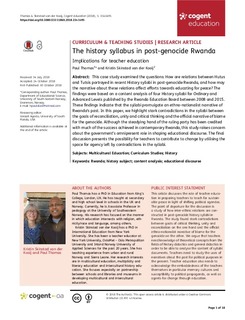The history syllabus in post-genocide Rwanda: Implications for teacher education
Journal article, Peer reviewed
Published version
Permanent lenke
http://hdl.handle.net/11250/2572086Utgivelsesdato
2018Metadata
Vis full innførselSamlinger
- Institutt for pedagogikk [295]
- Publikasjoner fra CRIStin [3781]
Sammendrag
This case study examined the questions: How are relations between Hutus and Tutsis portrayed in recent History syllabi in post-genocide Rwanda, and how may the narrative about these relations affect efforts towards educating for peace? The findings were based on a content analysis of four History syllabi for Ordinary and Advanced Levels published by the Rwanda Education Board between 2008 and 2015. These findings indicate that the syllabi promulgate an ethno-nationalist narrative of Rwanda’s past. In this paper, we highlight stark contradictions in the syllabi between the goals of reconciliation, unity and critical thinking and the official narrative of blame for the genocide. Although the steadying hand of the ruling party has been credited with much of the success achieved in contemporary Rwanda, this study raises concern about the government’s omnipresent role in shaping educational discourse. The final discussion presents the possibility for teachers to contribute to change by utilising the space for agency left by contradictions in the syllabi.
Beskrivelse
This open access article is distributed under a Creative Commons Attribution (CC-BY) 4.0 license.

